A what?
Well, narratives are the stories we tell ourselves about our lives: our values, our pasts, our future ambitions, our identities. Romance narratives are those that get all gooey and, well, romantic, like when you start to turn that girl/guy you’ve been hooking up with into a possible modern-day-fairy tale before you’ve even discussed politics with them. Before you get all slushy and defend romance, just realise I’m not attacking all romance, just the romance narratives that are traps…

Whether you’ve been in a long term relationship that doesn’t quite measure up to rom/com standards or you meet someone who gives you butterflies, your brain chemistry goes out of control and all of a sudden you’re a
love-zombie, checking your phone every other minute and day-dreaming about your shared future together, you’re in trouble. Does this sound familiar? Some people don’t seem to fall into the trap and some fall into the trap so well because it suits them so much that it isn’t even a trap, but I have been falling in and out of this trap for a long time and in the past few years I have been trying to figure out how to avoid it. Part of the problem with avoiding it is that all those brain chemicals are highly addictive and neptunian-delusional. The other part of the problem is that the romance narrative is just so fucking pervasive.
They read ya Cinderella…
…you hoped it would come true, and one day your prince charming would come rescue you… Anyone remember
that song from the 90s? It’s what I think of when I think of romance narrative examples – and IT’S A TRAP! Well, maybe not always, or maybe some traps are quite nice, but we’ve all grown up with unrealistic and unhealthy, bland and thoroughly hetero-normative narratives around romance – Disney is the easiest to blame, but really, it’s everywhere. Hey look, it’s a…
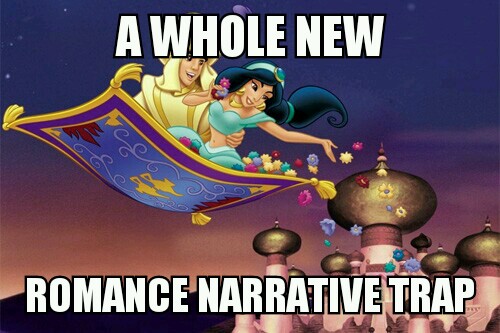 What’s wrong with Aladdin?
What’s wrong with Aladdin?
Let’s not go into the insidious racism and sexism, let’s stick to the romance issue here. So there’s this princess right, and she’s been sheltered and protected all her life and dresses like the genie in I Dream of Genie – and she’s just waiting for her hero, who is this nice, poor kid, with cool monkey who is very fit from running away from the police but, overall, a character with a good alignment (chaotic). You know how the story goes, even if you haven’t seen the movie, because it’s how all these stories go – there’s a bad guy, the hero saves the day with the princess helping out as his sidekick and they sail off into the sunset on their magic carpet: happily ever after.
This is what is supposed to happen, right?
You’re supposed to meet someone, go through a few trials and tribulations, and then after the plot climax everything’s peachy. I was raised not to believe in happily-ever-afters but my cynicism hasn’t saved me – if anything, it’s only made things worse, putting me at cross-purposes with my brain chemistry addiction.
 So what brain chemicals are involved?
So what brain chemicals are involved?
Dopamine: the reward pathway also associated with substances like cocaine and heroin. Dopamine is also known to affect your serotonin levels which can bring on low moods and further the motivation for more dopamine. So when you don’t get the response you want, or you haven’t had any positive attention for a while the withdrawals kick in…
love zombie attack! Yuck. If you’re wondering if he/she is your soul-mate, watching rom/coms imagining yourself and x as the leading characters, altering your appearance in accordance with what x might like… you’re in serious trouble. Brain chemistry isn’t the only way of looking at this thing… there is all that aforementioned unhealthy-social-programming to deconstruct, “bad” habits to break out of and psychological issues to consider like
insecure attachment.
Is it always a trap?
Yes and no. I have come to realise everything is a trap. Some traps are nice, some traps are comfortable, some traps help you feel like you’ve achieved something… saying everything is a trap detracts from the meaningfulness of the word ‘trap’, so we’ll just say it’s a trap when it’s dysfunctional. How does that sound? Is your romance narrative causing you grievous emotional harm? Are you wasting energy waiting for a text of continuously hassling your partner to be more romantic? Are you moping because there’s no one who loves you in ‘that’ way? Well, there you go… TRAP!
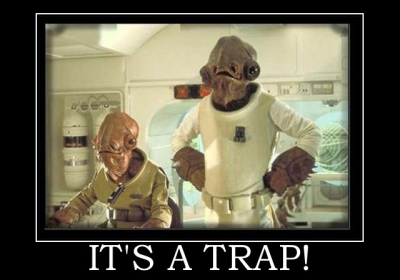 But what if x is my soulmate?
But what if x is my soulmate?
If you believe in soul-mates and that reincarnation shiz then take into consideration that a soulmate isn’t someone to give you happily-ever-afters, it’s someone who is here to give you major karmic lessons: lots and lots of pain and suffering, until you figure out how to learn from it and get out of the trap. The more you worry about whether it’s ‘meant to be’, the worse you are making it. Focus on learning your lessons rather than controlling uncontrollable variables. If something is meant to be it’s not worth worrying about, anyway, is it? It will just happen, whether you like it or not. Don’t get your free-will tied up in your determinism, it’s not sexy.
Okay, I’m in the trap, what can I do?
I don’t have all the answers, but I have read too many self-help books, so here’s some helpful advice:
1. Get some perspective
Step back from the drama of the romance, to stop sinking my energy into crazy fantasies. Don’t turn into a psi-vamp, you’re too good for that, and after a while your friends will stop wanting to hear about x and how awesome or horrible they are. Maybe x is your soulmate, but that’s neither here nor there. In your present life you have other more important shit you could be doing. Do it.
2. Bring it back.
Bring your focus and your energy back to you. You have been leaching it all over the place and it’s making a mess on the carpet. I have this mantra which also resembles
this 90s song, which ironically has extremely love zombie lyrics if you read the rest of it. Play this song and try to dance like in the music video. Go on.
3. Balance.
Balance everything – food, sleep, exercise, entertainment, meditation… be calm.
4. Get fulfilling creative interests.
There’s nothing better than fulfilling creative interests. Do something, make something, build on something. This will get your dopamine pathway functioning more healthily because you are being awesome and getting rewarded for it.
5. Meet own emotional needs.
Easier said than done, but you really are the most qualified person for the job. Be sensitive to your own feelings and figure out what needs aren’t being met – then find more awesome ways to meet those needs.
6. Stop talking about x all the time,
Just stop it. stop thinking about it so much, think about cats, cats are nice.
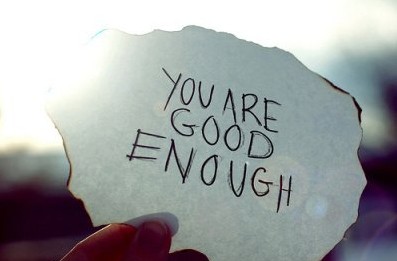 “I’m good enough” is digestible. It’s believable. It’s no great commitment, no great pressure. It’s acceptable, and it’s honest. There’s nothing wrong with being a good-enough mother, a good-enough daughter, or granddaughter or student or academic or writer or any of the other labels people tend to accumulate in their short lives. It is a calm, contented centre in an otherwise chaotic storm of great vulnerability, expectations and obligations. It’s an in-between road that is not a dead-end or wild goose-chase shortcut. It’s just a simple breath of fresh air. I’m good… enough. It’s an invitation to let go.
“I’m good enough” is digestible. It’s believable. It’s no great commitment, no great pressure. It’s acceptable, and it’s honest. There’s nothing wrong with being a good-enough mother, a good-enough daughter, or granddaughter or student or academic or writer or any of the other labels people tend to accumulate in their short lives. It is a calm, contented centre in an otherwise chaotic storm of great vulnerability, expectations and obligations. It’s an in-between road that is not a dead-end or wild goose-chase shortcut. It’s just a simple breath of fresh air. I’m good… enough. It’s an invitation to let go.
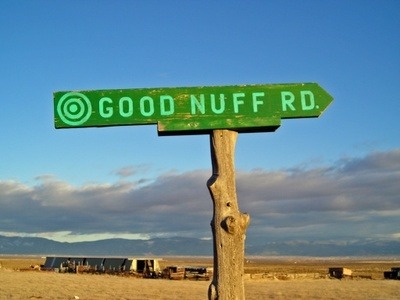 This is a time of letting go. It has been a frustrating and transformative couple of years. Today is about endings, about letting go, mourning the death of the old paradigm and making space… and resting… and allowing the new to arise. Today is a good time for acceptance, for allowing, for letting things be. Today, “good enough” is enough… and probably, tomorrow it will be too.
This is a time of letting go. It has been a frustrating and transformative couple of years. Today is about endings, about letting go, mourning the death of the old paradigm and making space… and resting… and allowing the new to arise. Today is a good time for acceptance, for allowing, for letting things be. Today, “good enough” is enough… and probably, tomorrow it will be too.





 The normal conscious beta mind can’t really do this, you need an altered state. But when you do get a glimpse here it is a beautiful and rare moment of clarity, of seeing the forest for the trees, of realising that most of the time we are just looking at a couple of pixels out of a massive screen and interpreting the world from a ridiculously narrow perspective. It’s interesting that it is the traps themselves that often provide a gateway for this kind of experience. The tension they create – the tension of contradiction – provides a platform for noticing… and a potentially transformative space.
The normal conscious beta mind can’t really do this, you need an altered state. But when you do get a glimpse here it is a beautiful and rare moment of clarity, of seeing the forest for the trees, of realising that most of the time we are just looking at a couple of pixels out of a massive screen and interpreting the world from a ridiculously narrow perspective. It’s interesting that it is the traps themselves that often provide a gateway for this kind of experience. The tension they create – the tension of contradiction – provides a platform for noticing… and a potentially transformative space.  “Bisexuals are greedy,” a friend once told me back in high school, “They should just make up their minds.” Her statement didn’t make any sense to me at the time, I was just on the verge of identifying as bisexual, but nobody knew that just then, and now most people still don’t, but there doesn’t seem to be any point in coming out when no body I care about would really care… or is there? Apart from female bisexuality being the focus of gratuitous heterosexual fetish, bisexuality is largely invisible and invisible things are easy to ignore and difficult to talk about, which is probably why there are thousands of bisexual women seeking out internet forums, confessing to the ether of cyberspace their similar stories.
“Bisexuals are greedy,” a friend once told me back in high school, “They should just make up their minds.” Her statement didn’t make any sense to me at the time, I was just on the verge of identifying as bisexual, but nobody knew that just then, and now most people still don’t, but there doesn’t seem to be any point in coming out when no body I care about would really care… or is there? Apart from female bisexuality being the focus of gratuitous heterosexual fetish, bisexuality is largely invisible and invisible things are easy to ignore and difficult to talk about, which is probably why there are thousands of bisexual women seeking out internet forums, confessing to the ether of cyberspace their similar stories.
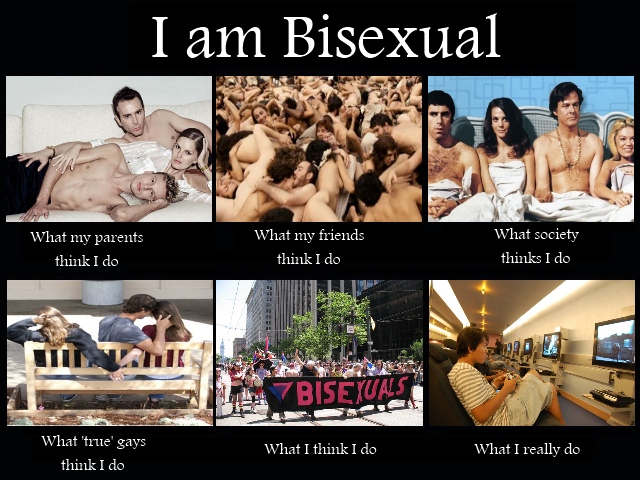 Many of these women are living what appear to be heterosexual lives but something is missing, they fall in love with their best friends but are unable to tell anyone. Telling friends could ruin a friendship, telling their husbands could ruin a marriage. Being public could mean being exposed to judgement. Many of these women are socially isolated, and have no connection to queer community, so the internet is the only safe space to express their hidden sexual identities, desires and the overwhelming longing that many of them share.
Many of these women are living what appear to be heterosexual lives but something is missing, they fall in love with their best friends but are unable to tell anyone. Telling friends could ruin a friendship, telling their husbands could ruin a marriage. Being public could mean being exposed to judgement. Many of these women are socially isolated, and have no connection to queer community, so the internet is the only safe space to express their hidden sexual identities, desires and the overwhelming longing that many of them share.
 Often bisexuality isn’t taken seriously. Mainstream society doesn’t know quite where to place it, other than in heterosexual fantasy or some quirky marginal category. Bisexuals often experience discrimination from within the queer community, sometimes resulting from the ease at which they can ‘fit in’ to heterosexual society. Male bisexuality, not often being the subject of heterosexual fantasy and is more subjected to homophobia. Bisexual men are often regarded as a myth, and are seen to be in some transitional period between thinking they’re straight and realising they’re gay. The New York Times recently ran an article about
Often bisexuality isn’t taken seriously. Mainstream society doesn’t know quite where to place it, other than in heterosexual fantasy or some quirky marginal category. Bisexuals often experience discrimination from within the queer community, sometimes resulting from the ease at which they can ‘fit in’ to heterosexual society. Male bisexuality, not often being the subject of heterosexual fantasy and is more subjected to homophobia. Bisexual men are often regarded as a myth, and are seen to be in some transitional period between thinking they’re straight and realising they’re gay. The New York Times recently ran an article about  For a lot of bisexual people, both men and women, it’s easier to ‘play straight’ and take on a heterosexual identity, at least publicly. Many still identify with dominant
For a lot of bisexual people, both men and women, it’s easier to ‘play straight’ and take on a heterosexual identity, at least publicly. Many still identify with dominant  Some people resent all identity labels, other people feel more closely connected to other communities and their sexual identity is submerged beneath labels like ‘mother’, ‘artist’, ‘lawyer’ or ethnicity and class related identity. Some people identify as ‘pansexual’ to include all the variances of gender rather than just two. ‘Bisexual’ is just one word to describe sexuality, which can be an intricate, fluid and complex thing. Since Kinsey, scales have been a common tool. People can be positioned or position themselves as a number or location on the scale, somewhere between heterosexual and homosexual. It’s quite simplistic, but it may be impossible to accurately map sexuality that differs from person to person and culture to culture.
Some people resent all identity labels, other people feel more closely connected to other communities and their sexual identity is submerged beneath labels like ‘mother’, ‘artist’, ‘lawyer’ or ethnicity and class related identity. Some people identify as ‘pansexual’ to include all the variances of gender rather than just two. ‘Bisexual’ is just one word to describe sexuality, which can be an intricate, fluid and complex thing. Since Kinsey, scales have been a common tool. People can be positioned or position themselves as a number or location on the scale, somewhere between heterosexual and homosexual. It’s quite simplistic, but it may be impossible to accurately map sexuality that differs from person to person and culture to culture.
 ‘Coming out’ as bi seems like nothing to shout about. The hesitation comes from questioning whether my sexual identity is private or public. I know some gay men who feel their sexuality is private and everyone assumes they are straight and other gay people who feel like it’s an important political statement – making a marginal group more visible. In recent years a few celebrities like Anna Paquin, Lady Gaga and Angelina Jolie have come out as bi in order to make such a statement. I don’t know whether these statements make much of a difference or whether they are just absorbed into the hetero fantasy or marginalised. Many of my historical heroines were bi including Frida kahlo, Virginia Woolf, Margaret Mead and Simone de Beauvoir, they were largely inside the invisible closet.
‘Coming out’ as bi seems like nothing to shout about. The hesitation comes from questioning whether my sexual identity is private or public. I know some gay men who feel their sexuality is private and everyone assumes they are straight and other gay people who feel like it’s an important political statement – making a marginal group more visible. In recent years a few celebrities like Anna Paquin, Lady Gaga and Angelina Jolie have come out as bi in order to make such a statement. I don’t know whether these statements make much of a difference or whether they are just absorbed into the hetero fantasy or marginalised. Many of my historical heroines were bi including Frida kahlo, Virginia Woolf, Margaret Mead and Simone de Beauvoir, they were largely inside the invisible closet.

 If you reach the destination of life, then what? Then you will be very embarrassed. –Osho
When I was growing up, us kids, enthralled by the deluxe smorgasbord of TV advertising, would continuously ask mum “can we go to Disneyland?” or other requests obviously out of our budget. “When I win Lotto” she would always reply. It took a while for us to realise she never bought lottery tickets. Despite that, she still had the fantasy herself: if I win lotto I’ll buy a place in the Coromandel…” I didn’t question it until recently when I started to wonder if this mass social delusion that more wealth (particularly if won) equals more happiness. Apparently it doesn’t.
If you reach the destination of life, then what? Then you will be very embarrassed. –Osho
When I was growing up, us kids, enthralled by the deluxe smorgasbord of TV advertising, would continuously ask mum “can we go to Disneyland?” or other requests obviously out of our budget. “When I win Lotto” she would always reply. It took a while for us to realise she never bought lottery tickets. Despite that, she still had the fantasy herself: if I win lotto I’ll buy a place in the Coromandel…” I didn’t question it until recently when I started to wonder if this mass social delusion that more wealth (particularly if won) equals more happiness. Apparently it doesn’t.
 The problem with the “if only”, lottery-type thinking is that it’s not in the moment. It comes from being unhappy with our jobs and our lives and our lack of options. We have been taught to think that money is the problem and that money (particularly a large lump of it right now) is the answer, but really, with more money just comes a different level of finance to deal with. Don’t get me wrong, having not-enough money and struggling for survival really sucks, but unless your fantasies about winning lotto are a helpful coping strategy for dealing with real hunger and desperation they are probably doing you more harm than good.
For most people who read this, who are in the pattern of ‘lottery thinking’, it is a little escape from the drudgery of every-day life. You wake up, you go to work, you work, you come home, you *insert escapist media here, eg: Playstation, movies, TV series, Facebook*, you maybe get a bit of creative time to work on building that model air-plane, writing that screen-play, painting that impressionist take on the New York skyline, re-designing your poodle’s coiffer, you practice in your steam-punk death-metal band and so on… and you dream… you dream of all the poodling, steampunking, screen-playing you could do if only …If only you had more time, if only you didn’t have to work.
Well, here’s a thought: how about, instead of fantasies and escapism, you try making little baby steps toward genuine happiness. There are two ways to do this and you probably should do both:
1: Choose to be happy. Try it now. Just one moment of happy. Just one moment of letting go of the struggle. Relax those shoulders. Breathe. Good, now go on. Don’t grimace. Smile. Yes, yes! That’s it! You’re doing it, baby. Every time you realise you’re in a yucky mind state, your going around in circles, you’re dreaming of that day you finally reach heaven STOP! Yes, now, relax. Smile. You don’t even have to smile, but find a tiny bit of happy just by dropping all the shit. I’m glad you’re so good at following instructions. The more you can choose happiness in moments, the more moments of happiness you may experience in your life. Don’t just depend on the external world for you happy, DIY it.
2. Make steps towards doing more of the things you really love. What really feeds you? Do you even know? If you’re not sure, think about the experiences you’ve had, the things you’ve created and done, that have given you moments of happiness. Don’t tell me you’re not creative. Creative is part of human. You are continuously creating the story of your life in your head (right now), how do you want your story to go? Try new things. Figure out what brings your joy, little by little. Write a list. Figure out what you want to contribute to the world in your lifetime. Make baby steps. If your job sucks the life out of you, look for a better one. If you don’t have a job, figure out how you can contribute to your community. Community can feed us when jobs can’t. If you love to paint, sing, write, draw, ski, ride, explore, love, share, don’t relegate your passion to: ‘if/when I have time’. Everyone has the same amount of time. Everyone. It’s how you use it. If you want to be happy, let yourself do the things that bring the happiness with them. Let go of your own internal barriers to happiness. It takes a lot of time to master an art so start right now. You never know, you could be the next professional poodle coifferer.
The problem with the “if only”, lottery-type thinking is that it’s not in the moment. It comes from being unhappy with our jobs and our lives and our lack of options. We have been taught to think that money is the problem and that money (particularly a large lump of it right now) is the answer, but really, with more money just comes a different level of finance to deal with. Don’t get me wrong, having not-enough money and struggling for survival really sucks, but unless your fantasies about winning lotto are a helpful coping strategy for dealing with real hunger and desperation they are probably doing you more harm than good.
For most people who read this, who are in the pattern of ‘lottery thinking’, it is a little escape from the drudgery of every-day life. You wake up, you go to work, you work, you come home, you *insert escapist media here, eg: Playstation, movies, TV series, Facebook*, you maybe get a bit of creative time to work on building that model air-plane, writing that screen-play, painting that impressionist take on the New York skyline, re-designing your poodle’s coiffer, you practice in your steam-punk death-metal band and so on… and you dream… you dream of all the poodling, steampunking, screen-playing you could do if only …If only you had more time, if only you didn’t have to work.
Well, here’s a thought: how about, instead of fantasies and escapism, you try making little baby steps toward genuine happiness. There are two ways to do this and you probably should do both:
1: Choose to be happy. Try it now. Just one moment of happy. Just one moment of letting go of the struggle. Relax those shoulders. Breathe. Good, now go on. Don’t grimace. Smile. Yes, yes! That’s it! You’re doing it, baby. Every time you realise you’re in a yucky mind state, your going around in circles, you’re dreaming of that day you finally reach heaven STOP! Yes, now, relax. Smile. You don’t even have to smile, but find a tiny bit of happy just by dropping all the shit. I’m glad you’re so good at following instructions. The more you can choose happiness in moments, the more moments of happiness you may experience in your life. Don’t just depend on the external world for you happy, DIY it.
2. Make steps towards doing more of the things you really love. What really feeds you? Do you even know? If you’re not sure, think about the experiences you’ve had, the things you’ve created and done, that have given you moments of happiness. Don’t tell me you’re not creative. Creative is part of human. You are continuously creating the story of your life in your head (right now), how do you want your story to go? Try new things. Figure out what brings your joy, little by little. Write a list. Figure out what you want to contribute to the world in your lifetime. Make baby steps. If your job sucks the life out of you, look for a better one. If you don’t have a job, figure out how you can contribute to your community. Community can feed us when jobs can’t. If you love to paint, sing, write, draw, ski, ride, explore, love, share, don’t relegate your passion to: ‘if/when I have time’. Everyone has the same amount of time. Everyone. It’s how you use it. If you want to be happy, let yourself do the things that bring the happiness with them. Let go of your own internal barriers to happiness. It takes a lot of time to master an art so start right now. You never know, you could be the next professional poodle coifferer.

 There are lots of things that are said so often that people take them for granted: if you work hard, you’ll succeed, people are lazy and selfish, and so on. We are usually so absorbed in our own culture that we don’t really see it, and therefore, can’t challenge the things that aren’t healthy/functional/true/ideal. After all, our culture is the water in which we swim. There are some serious problems with out dominant social discourses. Neoliberal ideas surrounding work and ‘the market’ tend to come under this bracket, so while I’m in a deconstructive mood I’m going to rant about a few of the false premises that people seem to take for granted:
1. People are essentially selfish and lazy
This is only a lie because it’s a partial truth: people are sometimes lazy and selfish, but that is not our essential nature (if we have one at all). People are communal animals. We are hard-wired for community. We get satisfaction from work that is meaningful and helpful, we get good vibes from doing nice things and helping other people. Assuming that we are all just selfish and lazy is actually kind of yuck. It’s an excuse to devalue some people’s lives because they haven’t achieved as much as other people.
2. We all have equal opportunities to succeed
Now, even to an amateur goldfish, this would sound ridiculous. No one really believes this, do they? There is absolutely no evidence for this assumption. Perhaps it is part of the fairy-tale of the uber-privileged who have no vision outside of their limitless choices. Okay, so maybe we don’t have equal opportunity to succeed, but surely even socially disadvantaged people have options, right? They have choices, right? Let’s just pretend that this is good enough.
3. Poor people are just making bad choices
This has been bugging me since I read Linda Tirado’s essay:
There are lots of things that are said so often that people take them for granted: if you work hard, you’ll succeed, people are lazy and selfish, and so on. We are usually so absorbed in our own culture that we don’t really see it, and therefore, can’t challenge the things that aren’t healthy/functional/true/ideal. After all, our culture is the water in which we swim. There are some serious problems with out dominant social discourses. Neoliberal ideas surrounding work and ‘the market’ tend to come under this bracket, so while I’m in a deconstructive mood I’m going to rant about a few of the false premises that people seem to take for granted:
1. People are essentially selfish and lazy
This is only a lie because it’s a partial truth: people are sometimes lazy and selfish, but that is not our essential nature (if we have one at all). People are communal animals. We are hard-wired for community. We get satisfaction from work that is meaningful and helpful, we get good vibes from doing nice things and helping other people. Assuming that we are all just selfish and lazy is actually kind of yuck. It’s an excuse to devalue some people’s lives because they haven’t achieved as much as other people.
2. We all have equal opportunities to succeed
Now, even to an amateur goldfish, this would sound ridiculous. No one really believes this, do they? There is absolutely no evidence for this assumption. Perhaps it is part of the fairy-tale of the uber-privileged who have no vision outside of their limitless choices. Okay, so maybe we don’t have equal opportunity to succeed, but surely even socially disadvantaged people have options, right? They have choices, right? Let’s just pretend that this is good enough.
3. Poor people are just making bad choices
This has been bugging me since I read Linda Tirado’s essay: 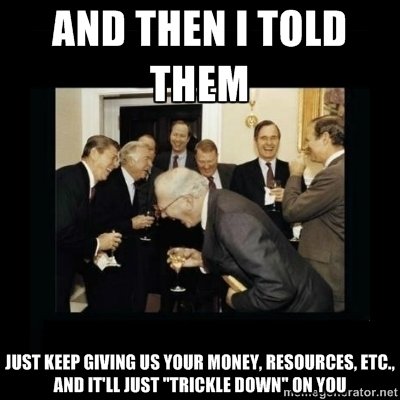 6. What is good for the economy is good for us
People seem to have this idea that the economy is very important and must grow at all costs, without really knowing what ‘the economy’ is and who it is serving. We all need to think a bit more critically about what ‘the economy’ actually is, every time these words crop up in conversation. The way we measure ‘the economy’ is actually just a number based on all the transactions (GDP) and lots of transactions might just mean lots of crises – earthquakes are great for the economy, times of peace are not. While the economy is booming we still have poverty, crime and deprivation, in fact, we seem to be getting even more of the above as the gap between rich and poor widens. What is good for ‘the economy’ is not necessarily good for us.
7. The market is holy
‘The market’ is a similar concept, used in the religious discourse of neoliberal devotees: the market will save us. Just let it be free. There is absolutely no evidence to support this religious belief. The main problem with this is that it leaves corporations free to exploit whomever they can, in whatever way they like. Corporations function much like cancer in the body – their job is to grow and grow and amass more and more resources. That is all. If you take all the power away from governments to regulate this kind of unhealthy social growth, you give all the power to the the tumors.
6. What is good for the economy is good for us
People seem to have this idea that the economy is very important and must grow at all costs, without really knowing what ‘the economy’ is and who it is serving. We all need to think a bit more critically about what ‘the economy’ actually is, every time these words crop up in conversation. The way we measure ‘the economy’ is actually just a number based on all the transactions (GDP) and lots of transactions might just mean lots of crises – earthquakes are great for the economy, times of peace are not. While the economy is booming we still have poverty, crime and deprivation, in fact, we seem to be getting even more of the above as the gap between rich and poor widens. What is good for ‘the economy’ is not necessarily good for us.
7. The market is holy
‘The market’ is a similar concept, used in the religious discourse of neoliberal devotees: the market will save us. Just let it be free. There is absolutely no evidence to support this religious belief. The main problem with this is that it leaves corporations free to exploit whomever they can, in whatever way they like. Corporations function much like cancer in the body – their job is to grow and grow and amass more and more resources. That is all. If you take all the power away from governments to regulate this kind of unhealthy social growth, you give all the power to the the tumors. 8. Paid work is morally good
This is based on the premise that people are inherently selfish and lazy. It’s much like the other puritan discourse in our social religion: we are all born sinners (selfish and lazy) and therefore to be morally good we must perform paid work – as much as possible – then we are able to feel self-righteous and superior to those who don’t work. If we are really really good we will even do unpaid work for charities or something, and if you work very hard for a long time you deserve your pension (not a Neoliberal idea) but any other dependence on the system is morally wrong and should be punished with verbal abuse and judgement, never mind that people who seek welfare are vulnerable and socially disadvantaged, never mind that they are human beings, never mind that the way they are treated by society and dysfunctional welfare systems is dehumanising and not really helping, never mind that poverty and social inequality is bad for everyone and that
8. Paid work is morally good
This is based on the premise that people are inherently selfish and lazy. It’s much like the other puritan discourse in our social religion: we are all born sinners (selfish and lazy) and therefore to be morally good we must perform paid work – as much as possible – then we are able to feel self-righteous and superior to those who don’t work. If we are really really good we will even do unpaid work for charities or something, and if you work very hard for a long time you deserve your pension (not a Neoliberal idea) but any other dependence on the system is morally wrong and should be punished with verbal abuse and judgement, never mind that people who seek welfare are vulnerable and socially disadvantaged, never mind that they are human beings, never mind that the way they are treated by society and dysfunctional welfare systems is dehumanising and not really helping, never mind that poverty and social inequality is bad for everyone and that 






 Does my meaning serve me? (THE ETERNAL QUESTION)
• Does it resonate?
• Does it make me happy, or worried?
• Does it help me do/be well?
• What does it make me create? (relationships, dramas, pictures, love, art, communication, joy, spreadsheets..?)
• What am I afraid of?
• What am I joyful of?
• Can I alter my meaning to make me more joyful and less afraid? (if not… why not?)
• How?
Some potential meanings:
We are the universe’s meaning-making babies – we were created by god/universe/whatever(?) To make meaning (love, art, abandon)
Having purpose is practical – whatever it is (within reason… uh?). Without purpose the chances of being effective are very low.
Some purposes:
To learn
To love
To be safe (the catch 22)
To make better
To challenge and question
To help
To share
To be recognised
To change
To heal
To be happy
Goals
It’s hard to achieve any goals if you don’t have any. Achieving makes for happy brain joy
Does my meaning serve me? (THE ETERNAL QUESTION)
• Does it resonate?
• Does it make me happy, or worried?
• Does it help me do/be well?
• What does it make me create? (relationships, dramas, pictures, love, art, communication, joy, spreadsheets..?)
• What am I afraid of?
• What am I joyful of?
• Can I alter my meaning to make me more joyful and less afraid? (if not… why not?)
• How?
Some potential meanings:
We are the universe’s meaning-making babies – we were created by god/universe/whatever(?) To make meaning (love, art, abandon)
Having purpose is practical – whatever it is (within reason… uh?). Without purpose the chances of being effective are very low.
Some purposes:
To learn
To love
To be safe (the catch 22)
To make better
To challenge and question
To help
To share
To be recognised
To change
To heal
To be happy
Goals
It’s hard to achieve any goals if you don’t have any. Achieving makes for happy brain joy 


